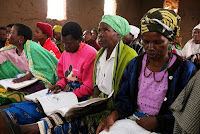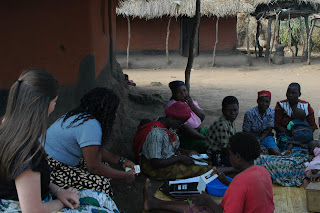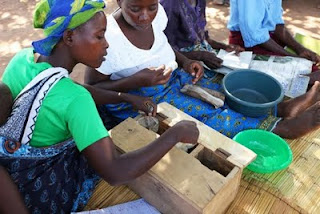written by Krystle Praestiin

Monday afternoon we arrived at our first borehole site drilled by ADRA Malawi. I had developed a basic plan for what shots I wanted to collect but I knew that plans on paper aren't always easily achieved in real life. So even though I was excited about this opportunity to film a very pertinent issue affecting many lives in Malawi, I was not sure what we would find. I was worried that we wouldn't meet any women drawing water, especially because at this particular village people were expecting us to arrive on Tuesday.
However, what struck me throughout the whole filming trip was that at every part of the day you could always find women and children using water for various purposes, such as washing clothes and drawing water for drinking, cooking or cleaning. It sure made our filming easier and reminded me of the integral role water plays in all our lives. I was also able to see that it was much easier for women with a borehole to collect water, particularly if one was near their homes, compared to the women who had to walk several meters/kilometres for water from a river, shallow well or stream.

After filming the borehole and its users, we arrived at a village where the people have been drawing water from an unprotected, shallow well. My first thoughts were - "I can't believe people actually drink this water." Some unprotected shallow wells are able to at least provide clear looking water, but this shallow well provided the community of 100 households with muddy soup. Filtering the water requires boiling, cooling, and then pouring the water through a towel into a clay pot. Unfortunately, this process isn't enough to prevent them from contracting water borne diseases like cholera and diahorrea. No one should have to drink that water. And just to top it off, upon further inspection we discovered that on one side of the well was a colony of frogs.
The best part of seeing this shallow well was knowing that in a few weeks time, this community would be receiving a borehole from ADRA Australia and the funds donated by individuals and organisations in Australia from REGEN, COMOS, Avondale College Church and Sanitarium.
Before we left - in true African style - the women and children danced and sang a song of thanks to ADRA for a future without the need of drawing water from the shallow well. It was a wonderful experience, knowing that a big difference would be made in their lives from the soon coming borehole.

Tuesday saw us walking three kilometres away from a borehole to a village where, due to such a distance from the borehole, the community is forced to collect water from a river. Before we left for our walk I drank water from my water bottle, quickly deciding that I would not take it on my journey. I think that decision came from guilt for having such easy access to clean water. It was hot, and the distance seemed to run further away from us the more we walked.
We arrived at the village, where we walked a bit further to reach the river, the main water source for this village. The bank leading down to the river was steep and slippery - to think that women do this in the rain with heavy buckets on their heads! I could barely do it in the dry with just a pen and a folder to carry. As we filmed, I learned from our guide that during the rainy season the river becomes "fierce", rising in volume and speed. At times people from the village have found human bones and clothes washed down from villages further up stream. Not many of us can say we find such things in our drinking water or experience life or death when getting a drink.

When filming was completed for that day, we faced the long walk back to the car and clean water. Water was much needed, as our long journey back saw us all getting very thirsty. I tried not to talk often in an attempt to maintain moisture inside my body. The whole party was very parched by the time we arrived back at the car where my large water bottle of iced water welcomed us all. I cannot imagine having to walk to a river in the hot sun to collect water, and then wait for it to boil and cool before I could drink it. Yet this journey of my own helped me to experience the reality of many communities in Malawi.
On Wednesday we filmed our main actress. We had hoped to film her during the very early morning just as the sun was rising. To do this we got up at 3 am and began our journey to the village, although as it turned out, even as the sun was rising there was not enough light to get a good picture on camera. Sadly our commitment did not show on the water documentary, but

despite the lack of footage, it was a good chance to see the village coming alive- from the burst of flames at various households, to the women, bucket in hand, walking in the early morning grey to collect their first bucket of water. At the river we also saw many of the activities that get preformed besides collecting water, such as washing clothes, cleaning food, washing hair and (much to one ladies enthusiasm for being on camera) other body parts (note: this was not actually filmed, and her privacy was somewhat maintained), all of this just within the same area that women were collecting drinking water.
To get somewhat clean water, women will dig out small holes in the river, creating a kind of well, however as we learned from many people that we interviewed the only way to combat water borne diseases is through a borehole which provides protected and clean water.

Our last day of filming was to collect any shots we had missed. Overall, the filming trip was a big learning experience, and it was amazing to see the difference that a borehole can make. Whenever we interviewed people with a borehole, at the end they would always request a borehole for neighbouring communities who did not have access to one. They saw the difference a borehole made and wanted others to share in it.
Currently, ADRA Malawi is drilling six boreholes, three of which were made possible through the support and donations of the individuals/groups and organisations within Australia. Tsogolo Labwino’s Project Manager Francis Zande says, "we are considered to be heroes by these communities. Instead of the planned three we are now drilling six. This is a great thing!"

To watch the water documentary video go to: http://www.youtube.com/watch?v=q71j6YUlMLM and see what a big difference you are making and can continue to make to people in need of clean water.
If you are interested in donating go to:
http://www.adra.org.au/support/donate.htm and donate to Krystle Clear Waters Project (Malawi).


















































